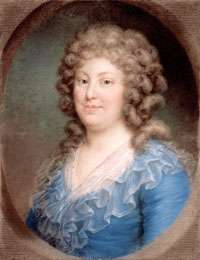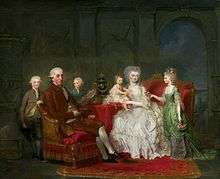Frederika Louisa of Hesse-Darmstadt
| Frederika Louisa of Hesse-Darmstadt | |
|---|---|
 | |
| Queen consort of Prussia | |
| Tenure | 17 August 1786 – 16 November 1797 |
| Born |
16 October 1751 Prenzlau |
| Died |
25 February 1805 (aged 53) Schloss Montbijou, Berlin, Prussia |
| Spouse | Frederick William II of Prussia |
| Issue |
Frederick William III Prince Louis Wilhelmina, Queen of the Netherlands Augusta, Electress of Hesse Prince Henry Prince Wilhelm |
| House | Hesse-Darmstadt |
| Father | Louis IX, Landgrave of Hesse-Darmstadt |
| Mother | Caroline of Zweibrücken |
Frederika Louisa of Hesse-Darmstadt (Friederike Luise; 16 October 1751 – 25 February 1805) was Queen consort of Prussia as the second wife of King Frederick William II.
Background
Frederika Louisa was the daughter of Louis IX, Landgrave of Hesse-Darmstadt, and Caroline of Zweibrücken. She was born in Prenzlau. She was the sister of Grand Duchess Louise of Saxe-Weimar-Eisenach, as well as Grand Duke Louis I of Hesse.
Marriage
She and Frederick William were married on 14 July 1769 at the Charlottenburg Palace, immediately after his divorce from Elisabeth Christine of Brunswick-Lüneburg. Frederick William called her his "Hessische Lieschen", or "Hessian Lizzie".
She became queen of Prussia upon her husband's accession to the throne in 1786, and kept her position for eleven years. The marriage was not happy, and Fredrick had numerous lovers, most notably Wilhelmine von Lichtenau, with whom he had a relationship from the same year he married Frederika Louise until his death. In 1787, her spouse committed bigamy by marrying her lady-in-waiting Julie von Voß, and in 1790, he committed bigamy again by marrying her lady-in-waiting Sophie von Dönhoff. Frederika Louisa was noted for her great generosity, especially to those in need.

From 1788, she spent her summers in Bad Freienwalde, where she was often visited by her children and grandchildren. This greatly contributed to the economic and cultural development of the city. Especially as a Queen Dowager, several buildings were constructed in the city to house her and her court during their stays. In 1799, a summer palace was built for her there by David Gilly.
She became a widow in 1797. Frederika Louisa has been described as eccentric, especially during her widowhood. It was claimed that she saw ghosts and apparitions, and for this reason she kept reversed hours, sleeping by day and waking by night.
The Swedish Princess Hedwig Elizabeth Charlotte described her at the time of her visit in 1798:
The Queen Dowager had invited us at déjeuner, and we left for Montbijou, a very simple manor slightly outside of Berlin, where she resides all year. It is sweet and well tendered but terribly small. She had it built herself, as well as the park and the garden. She is a small, very fat, middle aged lady, who walks so crocked that she looks like and old woman. You could mistake her for one of these fairies from an ancient tale. She is very polite and talkative and shines of a goodness which gives the witness of a kind heart and a noble character.[1]
She died in Berlin in 1805 having suffered a stroke.
Issue
- HM Frederick William III of Prussia (1770–1840); married Louise of Mecklenburg-Strelitz and had issue.
- HRH Princess Christine of Prussia (1772–1773)
- HRH Prince Louis Charles of Prussia (1773–1796); married Frederica of Mecklenburg-Strelitz and had issue.
- HRH Princess Wilhelmina of Prussia (1774–1837); married William I of the Netherlands and had issue.
- Stillborn son (born and died 1777)
- HRH Princess Augusta of Prussia (1780–1841); married William II, Elector of Hesse.
- HRH Prince Henry of Prussia (1781–1846)
- HRH Prince Wilhelm of Prussia (1783–1851); married Landgravine Marie Anna of Hesse-Homburg and had issue.
Titles, styles, honours and arms
Titles and styles
- 16 October 1751 - 14 July 1769: Her Serene HighnessLandgravine Friederike of Hesse-Darmstadt
- 14 July 1769 - 17 August 1786: Her Royal Highness The Crown Princess of Prussia
- 17 August 1786 - 16 November 1797: Her Majesty The Queen of Prussia
- 16 November 1797 - 25 February 1805: Her Majesty The Queen Dowager of Prussia
Ancestry
References
- ↑ Charlottas, Hedvig Elisabeth (1927) [1797–99]. af Klercker, Cecilia, ed. Hedvig Elisabeth Charlottas dagbok [The diary of Hedvig Elizabeth Charlotte] (in Swedish). VI 1797–1799. Translated by Cecilia af Klercker. Stockholm: P.A. Norstedt & Söners förlag. p. 122. OCLC 14111333. (search for all versions on WorldCat)
External links
![]() Media related to Frederika Louisa of Hesse-Darmstadt at Wikimedia Commons
Media related to Frederika Louisa of Hesse-Darmstadt at Wikimedia Commons
| Frederika Louisa of Hesse-Darmstadt Born: 16 October 1751 Died: 25 February 1805 | ||
| German royalty | ||
|---|---|---|
| Preceded by Elisabeth Christine of Brunswick-Bevern |
Queen consort of Prussia 17 August 1786 – 16 November 1797 |
Succeeded by Louise of Mecklenburg-Strelitz |